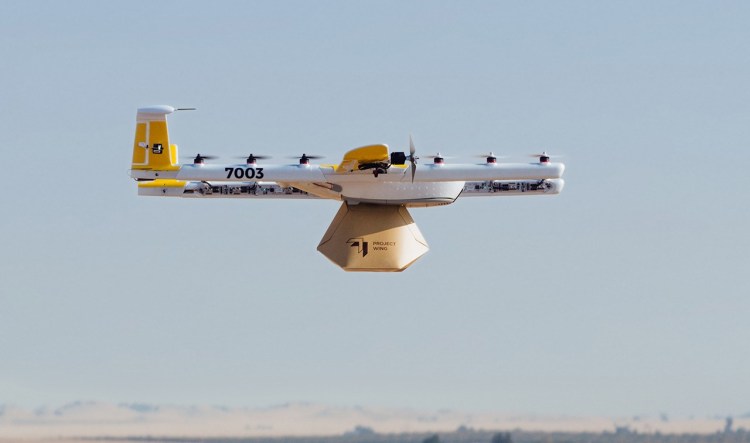Watch all the Transform 2020 sessions on-demand here.
Need food, a beverage, or a nasal decongestant in minutes flat? If you’re a resident of Canberra, Australia, you’ll soon be able to reserve airborne deliveries courtesy Wing, a graduate of Google parent company Alphabet’s X R&D lab. It today became one of the first companies to launch a commercial drone delivery service after the country’s aviation authority, Civil Aviation Safety Authority (CASA), granted it regulatory approval, following more than four years of testing.
Around 100 homes in the suburbs of Crace, Franklin, and Palmerston will have access to the service at launch, and if all goes well, it’ll expand to folks in Harrison and Gungahlin. (Eligible households will get a safety briefing about interacting with the drones.) Initially, the drones will operate between 7 a.m. and 8 p.m. on weekdays (and between 8 a.m. and 8 p.m. on Sundays), won’t be permitted to fly too close to people or over main roads, and will deliver goods from local businesses including Kickstart Expresso, Capital Chemist, Pure Gelato, Jasper + Myrtle, Bakers Delight, Guzman Y Gomez, and Drummond Golf.
The current-gen Wing drones can fly at speeds of up to 78 miles per hour and take off and land vertically, thanks to a dozen vertical rotors and two propellers. Automated flight-planning software determines their route, while onboard sensors help them to avoid obstacles.
Their sophisticated tech could result in substantial savings for — and a smaller carbon footprint from — local businesses, Wing contends. A commissioned report cited $9 million in annual cost savings, while a Rand Corporation study forecasted a 6% reduction in energy usage compared to trucks.
June 5th: The AI Audit in NYC
Join us next week in NYC to engage with top executive leaders, delving into strategies for auditing AI models to ensure fairness, optimal performance, and ethical compliance across diverse organizations. Secure your attendance for this exclusive invite-only event.
But it hasn’t exactly been smooth sailing.
According to a Wall Street Journal report last year, Wing’s drones have disrupted the lives of some longtime residents, who say that they don’t use their yards as much. User error has resulted in at least one accidental delivery, and the drones are sometimes forced to land due to high winds and obstructions.
In September 2016, the company partnered with fast-casual chain Chipotle in the U.S. to deliver orders for a small group of Virginia Tech students. But only a month later, Wing canceled a tentative collaboration with Starbucks over disagreements regarding the handling of customer data, according to Bloomberg.
Despite the bumps in the road so far, Wing is intent on forging ahead. CEO James Burgess recently announced it would launch a free 10-minute drone delivery trial in Helsinki, Finland, for items weighing 3.3 pounds or less up to a distance of 6.2 miles. Flight trials began earlier this year in Tampere and continued through the winter.
Alphabet is not the only company field-testing autonomous delivery drones, of course. Amazon launched a trial of Prime Air in the U.K. in December 2016. They delivered orders during the day, seven days a week, to shoppers who lived within a few miles of the retailer’s fulfillment center close to Cambridge.
In the intervening years, companies like Microsoft and startup Flytrex have trialed airborne delivery services in cities like Holly Springs, North Carolina and Wichita, Kansas. In May, Uber announced plans to deliver food by drone in San Diego, and FedEx plans to develop a drone-powered aircraft inspection program in Tennessee. And more recently, Matternet teamed up with UPS to launch an aerial delivery service from WakeMed’s flagship hospital and campus in Raleigh.
Reports show that the commercial drone industry continues to grow quickly, albeit from a small base. A 2017 forecast from Gartner projected the number of commercial drones sold that year would exceed 174,000. Moreover, about $454 million was thrown at UAV startups in 2016 alone, and the market is forecasted to become a $127 billion industry by 2020.


